A Wild Idea by Jonathan Franklin is a thrilling and inspiring account of one man’s audacious vision to protect one of the world’s most pristine and untouched wilderness areas. The book tells the remarkable story of Doug Tompkins, the co-founder of The North Face and Esprit, who left behind his successful business career to become one of the most significant conservationists of our time. Through Franklin’s detailed and compelling narrative, readers are introduced to the extraordinary efforts Tompkins undertook to preserve vast stretches of land in Patagonia, ultimately leading to the creation of some of the largest national parks in the world.

Jonathan Franklin, an accomplished journalist and author, brings his extensive experience in investigative reporting to this biography, delving deep into the life and motivations of Doug Tompkins. Franklin’s writing is engaging and meticulously researched, providing a comprehensive look at Tompkins’ transition from a high-powered entrepreneur to a passionate environmental activist. The book not only chronicles Tompkins’ conservation achievements but also explores the personal sacrifices, challenges, and controversies that marked his journey.
The heart of A Wild Idea is Tompkins’ bold vision for Patagonia, a region of breathtaking beauty and ecological importance in southern Chile and Argentina. After selling his stakes in The North Face and Esprit, Tompkins used his wealth to purchase millions of acres of land in Patagonia with the goal of protecting it from development and exploitation. Franklin takes readers through the process of land acquisition, the painstaking efforts to restore degraded areas, and the eventual donation of these lands to create national parks.
Franklin’s portrayal of Tompkins is multifaceted. He presents Tompkins as a man driven by an uncompromising commitment to conservation, a visionary who was willing to take on immense risks and face fierce opposition to achieve his goals. At the same time, Franklin does not shy away from discussing the criticisms and challenges Tompkins faced—both from local communities who were initially suspicious of his intentions and from powerful political and economic interests that viewed his conservation efforts as a threat.
One of the most compelling aspects of A Wild Idea is the exploration of the relationship between Tompkins and his wife, Kris McDivitt Tompkins, a former CEO of Patagonia, Inc., who played a crucial role in their shared conservation mission. Franklin delves into the dynamics of their partnership, showing how their combined efforts and mutual dedication to environmental causes amplified the impact of their work. The book highlights how their love for each other and for the natural world fueled their relentless pursuit of creating protected areas that would benefit future generations.
Franklin’s narrative also captures the stunning landscapes of Patagonia, painting vivid pictures of the mountains, rivers, forests, and wildlife that inspired Tompkins’ passion for conservation. Through Franklin’s descriptions, readers gain a deeper appreciation for the importance of preserving these wild places, not only for their ecological value but also for the spiritual and emotional solace they offer.
In A Wild Idea, Franklin goes beyond the story of land conservation to address broader themes of environmentalism, sustainability, and the role of individuals in effecting change. He examines the legacy of Tompkins’ work, considering how his actions have influenced global conservation efforts and inspired a new generation of environmental activists. The book raises important questions about the balance between economic development and environmental protection, and the moral responsibility to safeguard the planet’s remaining wild places.
A Wild Idea by Jonathan Franklin is a powerful and inspiring tribute to Doug Tompkins’ life and legacy. It is a story of vision, determination, and the belief that one person’s actions can make a profound difference in the world. Franklin’s account is both a celebration of Tompkins’ achievements and a call to action for readers to consider how they, too, can contribute to the preservation of our planet’s natural heritage.
As Franklin reflects in the book, Tompkins’ legacy is not just the land he protected, but the wild idea that our most ambitious dreams for a better world are worth pursuing, no matter the obstacles. A Wild Idea is essential reading for anyone interested in conservation, environmental activism, and the power of visionary leadership. It is a reminder that the wild places of the earth are not just our heritage—they are our responsibility.











